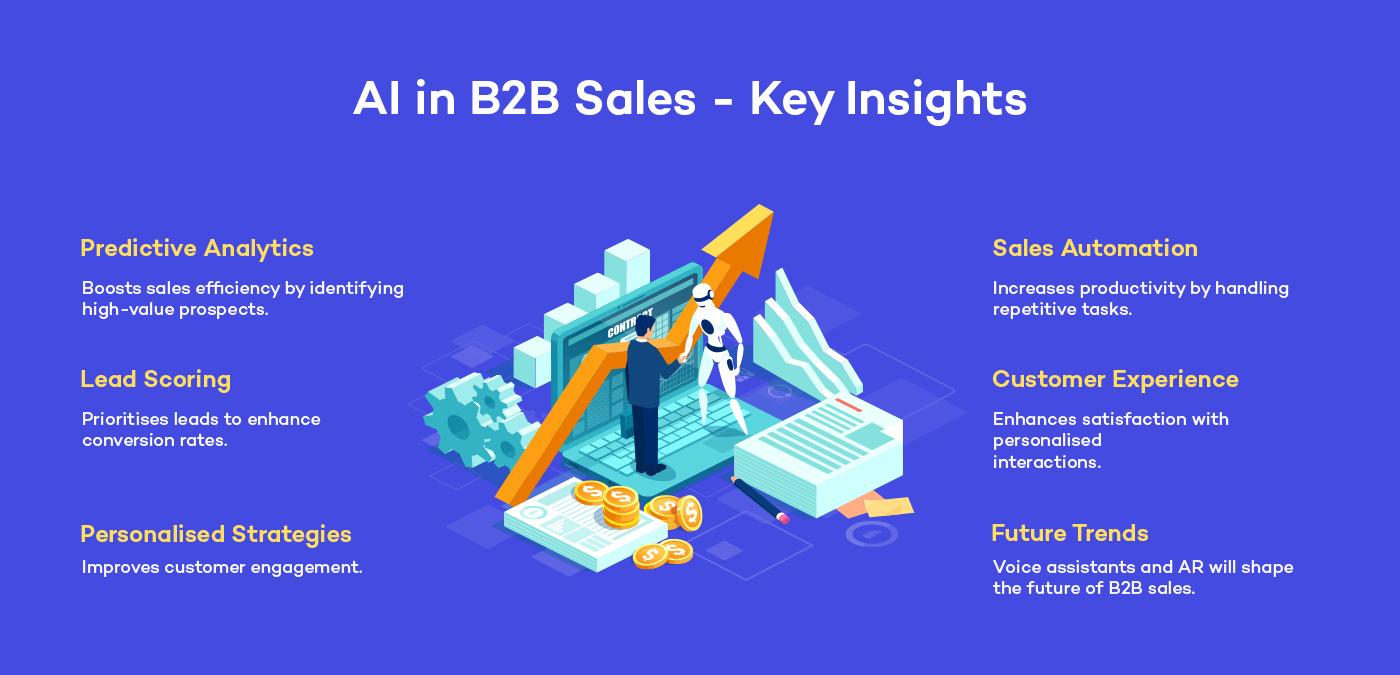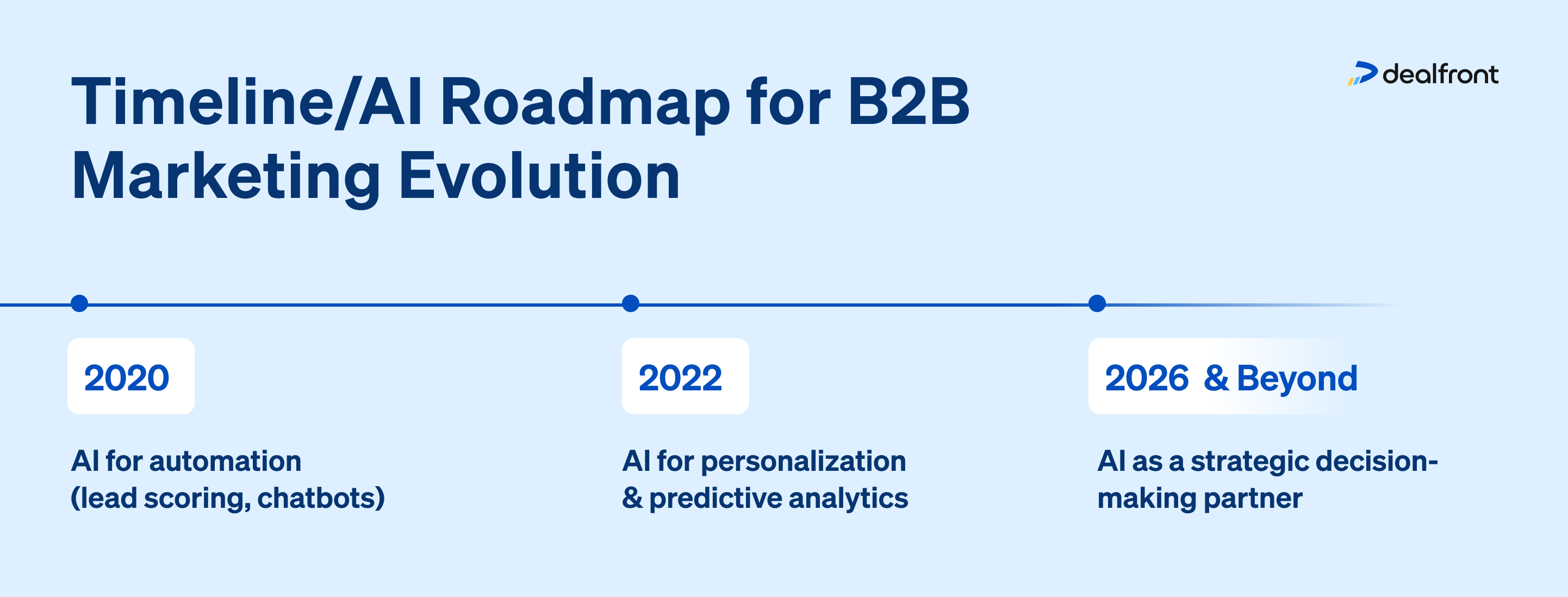How AI Automation For B2B enhances strategic planning and decision-making
Wiki Article
Revolutionize Your Business: How AI Automation Is Transforming B2B Operations
AI automation is improving B2B procedures in substantial ways. Business are adopting this innovation to simplify workflows and boost efficiency. As tasks come to be automated, organizations can concentrate on calculated growth instead of mundane processes. The implications of these adjustments are extensive, influencing every little thing from customer communications to supply chain monitoring. Recognizing this improvement is vital, as the future of company hinges on the efficient combination of AI into daily procedures. What exists in advance in this developing landscape?Comprehending AI Automation in B2B Context
As services significantly seek efficiency, understanding AI automation within the B2B context ends up being essential. AI automation describes the application of man-made knowledge technologies to boost and improve company procedures. In B2B environments, this can show up in different kinds, such as automating information entry, enhancing supply chain logistics, or enhancing stock administration. Organizations leveraging AI automation can reduce operational expenses, minimize human mistake, and rise performance. AI devices can examine large quantities of data to provide actionable understandings, enabling informed decision-making. The assimilation of AI into B2B operations not just transforms traditional operations but likewise cultivates dexterity and scalability, permitting businesses to adapt to market adjustments quickly and properly. Accepting this technology is crucial for staying affordable in today's electronic landscape.Enhancing Customer Experience Through AI
How can AI transform client interactions in the B2B field? AI improves client experience by supplying individualized, timely, and efficient service. Intelligent chatbots and online aides can take care of queries 24/7, guaranteeing customers obtain instant actions. Anticipating analytics allow services to anticipate client requirements, tailoring offerings accordingly. AI-driven platforms can examine customer information, enabling targeted advertising and marketing approaches and improved involvement. Additionally, belief analysis devices analyze consumer responses, helping organizations tweak their services. By automating routine jobs, AI liberates human sources to focus on high-value interactions, fostering stronger connections. The assimilation of AI not only improves communication however additionally constructs depend on and loyalty, ultimately elevating the total consumer experience in the competitive B2B landscape.Simplifying Supply Chain Management With AI
AI plays a necessary function in optimizing supply chain monitoring through predictive analytics and automated stock control (Business Process Automation). By leveraging anticipating analytics, companies can anticipate need changes and readjust their procedures accordingly. Automated supply systems better enhance efficiency by making sure supply levels are kept, decreasing waste and boosting general productivity
Predictive Analytics Benefits
While many companies encounter obstacles in taking care of intricate supply chains, predictive analytics offers a transformative service by leveraging vast quantities of information to forecast trends and maximize operations. By examining historic information together with real-time inputs, anticipating analytics enables companies to recognize patterns and expect future needs. This insight permits even more informed decision-making, boosting effectiveness and minimizing costs. In enhancement, organizations can proactively attend to prospective disturbances by predicting supply chain traffic jams and adjusting methods accordingly. The assimilation of anticipating analytics not only improves inventory monitoring yet also promotes more powerful relationships with vendors and clients with prompt reactions to market changes. Ultimately, the fostering of predictive analytics empowers companies to stay competitive in an increasingly dynamic business environment.Automated Stock Control
As organizations progressively depend on anticipating analytics to maximize supply chain operations, automated stock control arises as a powerful ally in this initiative. By leveraging AI-driven modern technologies, business can enhance precision in supply monitoring, decrease stockouts, and minimize excess supply. Automated systems examine real-time data, allowing organizations to forecast need changes and adjust supply levels as necessary. This not only enhances order gratification however additionally boosts cash money flow management by decreasing holding expenses. In addition, AI can recognize patterns in purchasing habits, allowing even more enlightened decision-making regarding supplier partnerships and procurement methods. Eventually, automated stock control not just increases functional effectiveness however likewise boosts consumer satisfaction by guaranteeing item schedule, strengthening its function as an essential component in contemporary supply chain administration.Data-Driven Choice Making Powered by AI
In today's competitive landscape, companies progressively depend on data-driven decision-making to enhance operational performance and calculated preparation. Artificial intelligence plays a pivotal role in this improvement by assessing huge amounts of information quickly and precisely. AI algorithms determine patterns, trends, and abnormalities that human experts could overlook, enabling companies to make enlightened decisions based upon real-time understandings - Minarik AI. This capability allows companies to predict market shifts, enhance resource allotment, and tailor their offerings to customer requirements. Furthermore, AI-driven analytics facilitate risk assessment and monitoring, guaranteeing that companies can browse unpredictabilities effectively. By leveraging these sophisticated devices, organizations not only enhance their decision-making procedures but likewise obtain a competitive advantage in their particular markets, fostering development and technologyAutomating Repetitive Tasks to Boost Performance
Simplifying repetitive jobs through automation greatly boosts productivity within B2B procedures. By applying AI-driven solutions, companies can get rid of mundane activities such as data access, invoice processing, and report generation. This change allows staff members to concentrate on higher-value tasks, cultivating creativity and calculated thinking. Automating these time-consuming procedures not only reduces human mistake however also speeds up workflow effectiveness. In addition, organizations can achieve constant outcomes and boosted precision, which is critical in preserving client satisfaction. The integration of automation tools makes it possible for companies to allocate sources a lot more successfully, making sure that teams can react quickly to market needs. Eventually, adopting AI for repetitive tasks is a calculated move that changes operational capabilities and drives total organization growth.Integrating AI With Existing Company Procedures
Many organizations encounter difficulties when integrating AI with existing business procedures. These challenges commonly originate from an absence of comprehending relating to exactly how AI can match existing operations. Effective combination requires a complete evaluation of existing procedures to determine locations where AI can include value. Organizations should likewise guarantee that their groups are furnished with the needed skills to leverage AI tools successfully - Growth Systems For B2B. Additionally, smooth combination depends upon the compatibility of AI innovations with heritage systems. Business usually discover it advantageous to take on a phased technique, piloting AI applications in particular divisions before a wider rollout. This technique permits for changes based upon initial responses, guaranteeing smoother changes and making best use of the prospective benefits of AI automation in improving productivity and efficiencyFuture Patterns in AI Automation for B2B Business
As B2B companies aim to the future, boosted information analytics is set to play a crucial duty in driving decision-making processes. Intelligent procedure automation will additionally become a key trend, improving and improving operations performance. These advancements assure to improve just how businesses run, inevitably bring about more receptive and active companies.Enhanced Data Analytics
While services increasingly depend on data-driven decisions, the role of AI in boosting data analytics is coming to be a lot more important in B2B operations. AI modern technologies promote the collection and evaluation of vast datasets, enabling business to discover important understandings that drive strategic preparation. Anticipating analytics powered by AI permits organizations to anticipate market trends and consumer behavior with greater precision. Additionally, artificial intelligence algorithms enhance data interpretation, recognizing patterns that human analysts might forget. This leads see it here to even more informed decision-making and optimized source allocation. As B2B firms remain to embrace AI-driven analytics, they can anticipate better functional effectiveness, improved client experiences, and a competitive edge on the market. The future of information analytics in B2B rests on incorporating innovative AI abilities.Smart Refine Automation
Intelligent Refine Automation (IPA) is poised to revolutionize B2B operations by perfectly incorporating AI technologies with standard business processes. This innovative strategy combines robot procedure automation (RPA) with sophisticated AI capacities, making it possible for companies to improve efficiency and accuracy. Companies can automate repeated tasks, such as information entry and invoice processing, allowing staff members to focus on tactical campaigns. IPA also leverages artificial intelligence and all-natural language processing, boosting decision-making via real-time information analysis. As companies increasingly embrace IPA, they can expect substantial cost reductions and boosted customer experiences. Future trends suggest a growing reliance on IPA for scalability and versatility, placing companies to thrive in an ever-evolving industry. Embracing IPA will certainly be vital for preserving competition in the digital age.Regularly Asked Questions
What Industries Benefit The Majority Of From AI Automation in B2B Operations?

Just How Can Small Companies Implement AI Automation Successfully?
Local business can execute AI automation successfully by recognizing repetitive jobs, picking ideal tools, incorporating options slowly, educating personnel, and continuously analyzing efficiency to maximize procedures, ensuring a smooth changeover and optimizing efficiency.What Are the Costs Related To AI Automation Implementation?
The costs linked with AI automation implementation commonly consist of software application acquisition, framework upgrades, training personnel, recurring maintenance, and possible examination fees. These expenditures can vary significantly based upon the scale and intricacy of the automation options picked.How Do I Determine ROI From AI Automation Initiatives?
To gauge ROI from AI automation campaigns, one ought to assess cost financial savings, performance enhancements, and earnings growth against execution expenses. Tracking crucial efficiency indications gradually supplies useful insights right into efficiency and total roi.What Skills Are Needed to Manage AI Automation Projects?
Effective monitoring of AI automation tasks calls for skills in task administration, data evaluation, programs, and understanding AI modern technologies. Furthermore, solid communication, analytic capacities, and adaptability are crucial for maneuvering the complexities of such initiatives.As organizations significantly look for performance, comprehending AI automation within the B2B context becomes crucial. The combination of AI right into B2B operations not only transforms typical operations but likewise cultivates agility and scalability, allowing organizations to adapt to market adjustments quickly and successfully. While businesses significantly count on data-driven choices, the duty of AI in boosting data analytics is coming to be much more necessary in B2B procedures - AI Automation For B2B. Smart Process Automation (IPA) is poised to revolutionize B2B operations by effortlessly incorporating AI modern technologies with typical business procedures. Effective administration of AI automation jobs needs abilities in job administration, data analysis, programming, and recognizing AI technologies
Report this wiki page